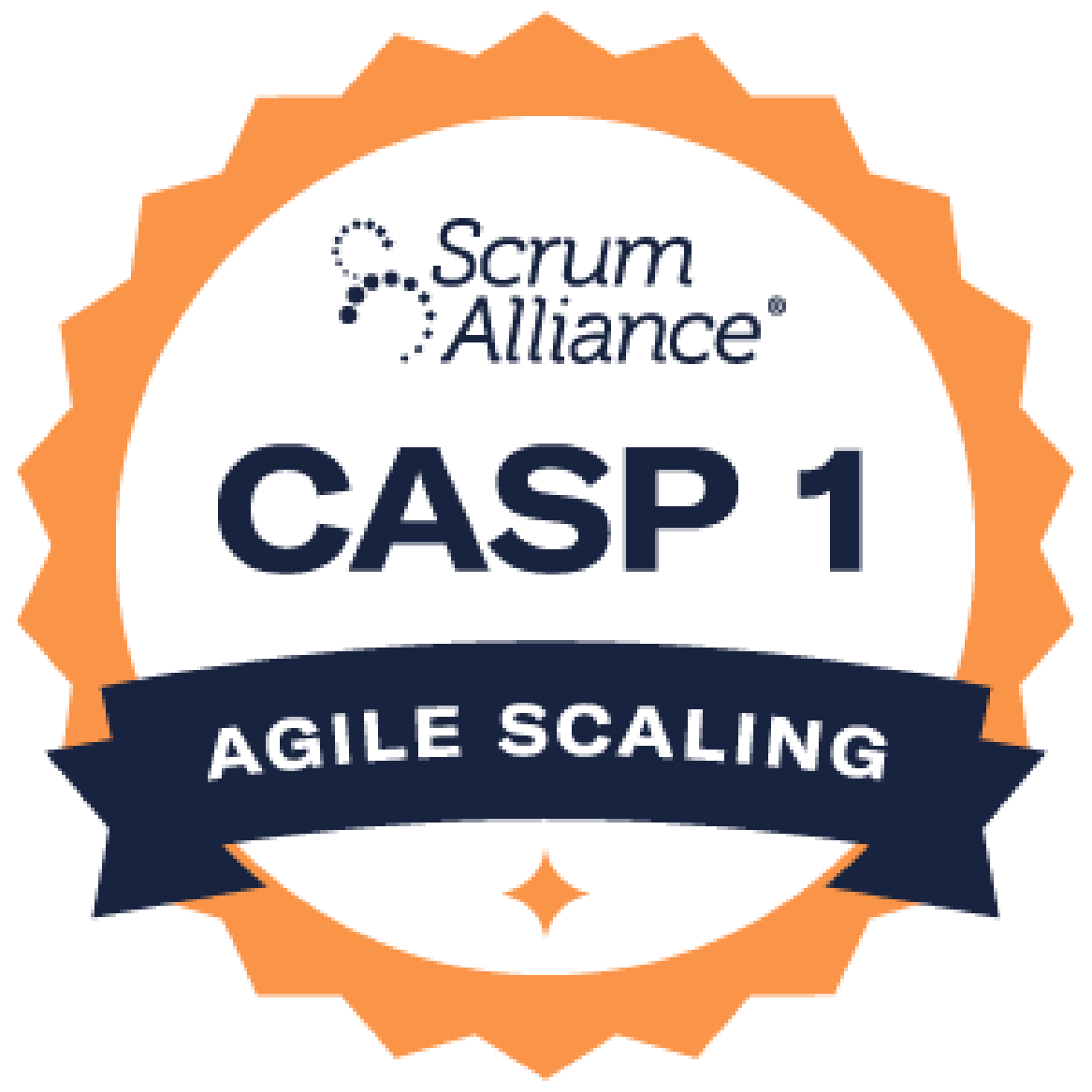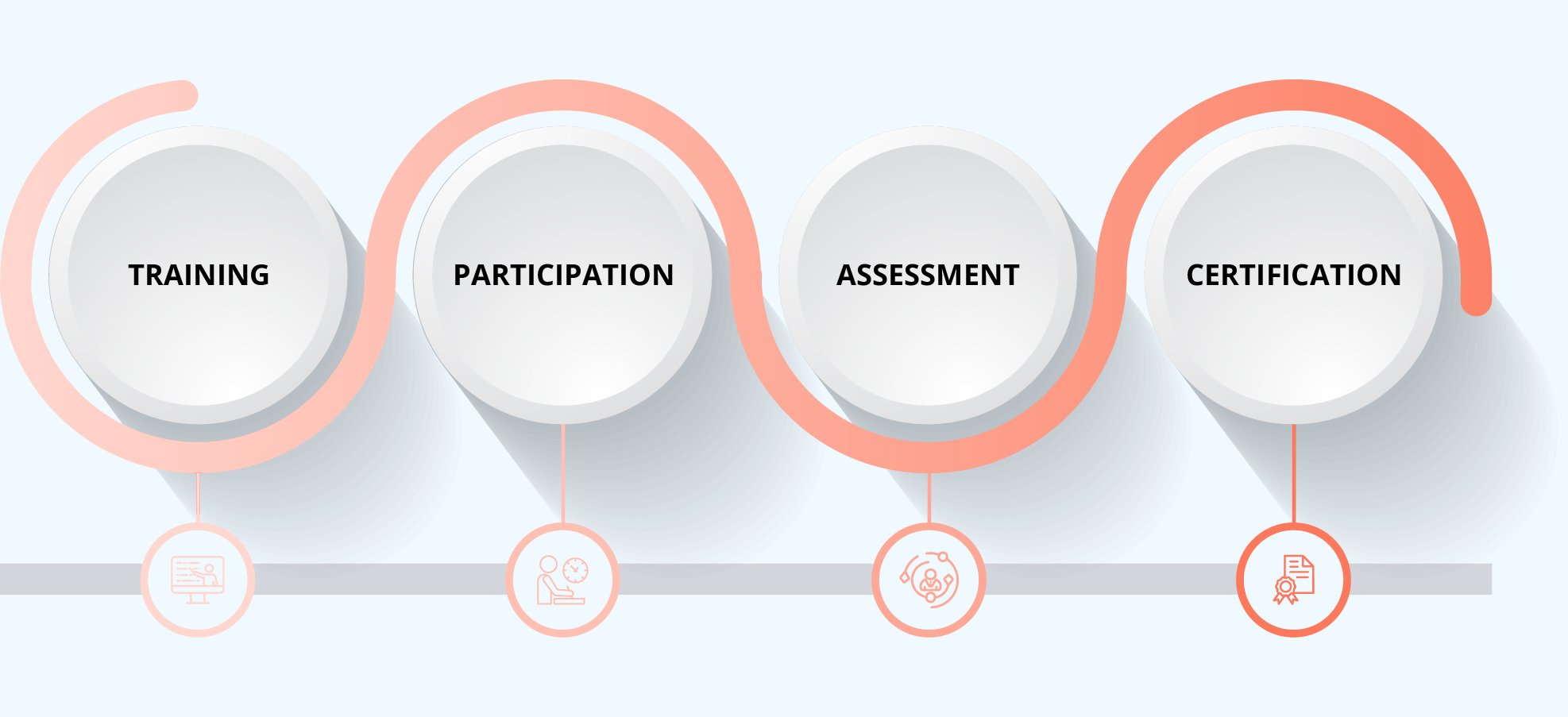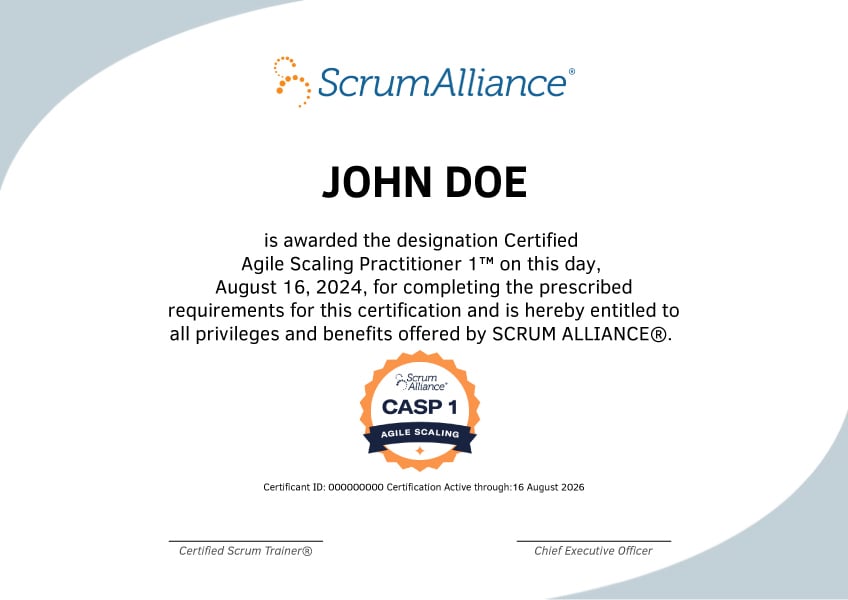

Licensed Training Partner
Top Rated Certified Agile Scaling Practitioner 1 Certification
Certified Agile Scaling Practitioner 1 (CASP 1) Certification Training
The Most Comprehensive Certification Course for Guaranteed Career Success
1.2K+ Enrolled
Accredited by

_1769597476.png)

The Certified Agile Scaling Practitioner 1 (CASP 1) training is a valuable certification offered by Scrum Alliance to supercharge your organization's agility. Completing this CASP 1 certification course with Simpliaxis is designed for leaders, managers, and those implementing agile practices wanting to execute agile methods in their organization. Whether starting out or amidst transformations, this training optimizes agile methodologies for improved team performance.
Read more...Accredited by

_1769597476.png)

Licensed Training Partner
Top Rated Certified Agile Scaling Practitioner 1 Certification

5.0
1.2K+ Enrolled
The Most Comprehensive Certification Course for Guaranteed Career Success

The Certified Agile Scaling Practitioner 1 (CASP 1) training is a valuable certification offered by Scrum Alliance to supercharge your organization's agility. Completing this CASP 1 certification course with Simpliaxis is designed for leaders, managers, and those implementing agile practices wanting to execute agile methods in their organization. Whether starting out or amidst transformations, this training optimizes agile methodologies for improved team performance.
Read more...Accredited by

_1769597476.png)

The Certified Agile Scaling Practitioner 1 (CASP 1) training is a valuable certification offered by Scrum Alliance to supercharge your organization's agility. Completing this CASP 1 certification course with Simpliaxis is designed for leaders, managers, and those implementing agile practices wanting to execute agile methods in their organization. Whether starting out or amidst transformations, this training optimizes agile methodologies for improved team performance.
Read more...

Guaranteed to Run Workshops

Expert-Led Study Sessions

Networking Opportunities

Flexible Monthly Payment Plans

Real-World Case Studies

Hands-On Project Experience
Request More Details
450K+
Professionals trained
250+
Workshops every month
30+
Trainers
450K+
Professionals trained
250+
Workshops every month
20+
Trainers
Course Overview
Simpliaxis provides a unique learning experience to help you grasp this esteemed CASP 1 course designed to break through limitations. CASP 1 departs from a prescriptive, one-size-fits-all approach and instead focuses on developing a pattern-based understanding of scaling Agile. You will learn to identify recurring challenges and opportunities specific to your organization's context. This empowers you to select and implement the most effective scaling patterns customized to your unique needs.
Simpliaxis, as a Scrum Alliance Registered Educational Ally, offers a CASP 1 training program that goes beyond the fundamentals: Move from a framework-centric approach to a pattern-based perspective. Gain the ability to recognize underlying structures in scaling challenges, enabling you to choose the most fitting solutions. Benefit from instructors who are not only certified trainers but also experienced agile and scrum practitioners.
We Simpliaxis will translate theoretical concepts into real-world scenarios, ensuring the learnings directly apply to your organization's context. Simpliaxis leverages their partnership to provide access to the latest Scrum Alliance resources and materials. This ensures you gain the most up-to-date knowledge and industry best practices.

CASP 1 Training Highlights
16-hour LIVE Instructor-led Sessions
Get Trained by Experienced Agile Instructors
Two-year membership with Scrum Alliance
24/7 Support and Learning Assistance

Career upliftment

The Certified Agile Scaling Practitioner 1 course offers several learning opportunities for professionals interested in scaling agile practices in their organizations. Let's look into the learning opportunities it provides:

Unsure about your prep?

Benefits focused on Individuals and corporate
Common attendees
Organizational Leaders
Change Agents
Managers
Executive
Coaches
Agilists
Anyone interested in improving agile practices

Prerequisites for CASP 1 certification training
Let's explore the eligibility requirements for Certified Agile Scaling Practitioner 1 (CASP 1) and ensure you meet the prerequisites for this certification.

Training:
Register for Simpliaxis’s CASP 1 course. Discuss the prerequisites and curriculum with the trainers.
Participation:
Participate actively in workshops, exercises, and training sessions to understand Agile Patterns, Transformation, Change Management, Scaling Concepts, and so on.
Assessment:
Complete evaluations and assessments on time to showcase your expertise in Agile scaling skills.
Certification:
Obtain the CASP 1 certification to demonstrate your knowledge in Agile scaling and its applications in large organizations.

Get the CASP 1 Certification

Curriculum
Course Curriculum
What you will learn in this CASP 1 workshop
Definition of scaling agile
Let’s understand Agile is a way of working that emphasizes flexibility, collaboration, and iterative progress. Learn how Scaling Agile applies these principles to bigger groups of people and more complex projects.
Importance and Urgency of Scaling
Learn the importance of Agile Scaling. As businesses grow, they need to maintain the same level of flexibility and efficiency that Agile provides. Without scaling, teams can become less adaptable and slow to respond to changes in the market, which can lead to delays and missed opportunities.
Philosophy of Scaling: ScalED vs. ScalING vs. DEscaling
Learn the different approaches to scaling Agile: following predefined frameworks, continuously adapting Agile practices, and simplifying processes when they become too complex.
Understanding Patterns and Anti-Patterns
Understand the patterns, which are successful practices or strategies identified in Agile implementations. Anti-patterns, on the other hand, are common pitfalls or mistakes to avoid. Understanding these helps teams learn from past experiences and make better decisions.
Using Scaffolds to work in a safer place
Learn about Scaffolds support structures that help teams implement Agile practices more effectively. They provide guidance and resources to ensure teams work efficiently and safely, reducing the risk of mistakes or failures.
Frameworks and their Relationship to Patterns
Learn about Frameworks like SAFe, LeSS (Large Scale Scrum), or Nexus, which provide structured approaches to scaling Agile. They often incorporate established patterns to help organizations navigate common challenges more easily.
Organizational Change Management (OCM)
OCM is about managing the people's side of change within an organization. When scaling Agile, it's essential to consider how it will impact individuals, teams, and the overall culture. OCM helps ensure everyone is on board and ready to embrace Agile practices.
Applying Patterns
These are real-life examples of how Agile patterns have been used successfully in different organizations. By studying these examples, teams can gain insights into how to apply similar strategies in their own context. In simple terms, this training is designed to help people learn how to improve Agile work in their organizations. It gives learners the skills and resources they need to make their teams more flexible, work together better, and keep getting better at what they do.

40+ Certification programs made an impact
Employee retention improved by 45%
Work satisfaction and capabilities improved by 30% on an average
100+
Clients













CASP 1 Certification Course For Corporates

Our Customer words for us
Meet the Team That's Invested in Your Success
What is the CASP 1 Course with Simpliaxis?
Are there any prerequisites to join the CAS-S1 course?
How long does the CASP 1 training take to complete?
What topics does the CASP 1 course cover?
How can I enroll in the CASP 1 course with Simpliaxis?
What are the benefits of CASP 1 certification?
Is there any support available after completing the CASP-1 course with Simpliaxis?
Is Certified Agile Scaling Practitioner 1 certification worth it?
Is there any examination for CASP 1?
What happens to my token or partial payment if I don’t enroll immediately?
Is there a preferred currency for payment, especially for international students?
Can payments be made online through your website, or do I need to visit a physical location?
Do you offer any discounts or promotions for early payment?
Can I pay for the course in installments, or is full payment required upfront?
Will I get a refund if I cancel my enrollment?
Where will I get my payment receipt?
Is there any transaction or processing fee?
What cards do you accept?
What payment options are available?
What if I miss a class? Are there any money back options?
If I want to know more about Training, whom should I connect with?
Is there any option to complete the Training in the native language if a participant chooses to?
Can I receive personalized Training at my convenience?
Where do I find the upcoming schedules of my course?
After enrollment, can I change the date of my training class?
Do I get any certificate upon completion of the course?
How do I enroll in the training course?
What are the different courses offered by Simpliaxis?
What are the different modes of Training available for Simpliaxis courses?
Do you offer online Training?
Do you offer corporate Training?
Who are the instructors of my course?
Is there any discount available for the Simpliaxis courses?
Whom do I contact if I have more queries regarding my course?
Are your courses affordable?
Why should I choose Simpliaxis?
What is the object of Simpliaxis?
How much discount will I get if I enroll for the Training?
CASP 1 Course FAQs
You can reach out to our experienced career counselor
or email us on support@simpliaxis.com
or contact any of our phone numbers
or you can chat with us anytime
or visit our contact us page https://www.simpliaxis.com/contact-us
Find out why 1,000+ professionals love SimpliAxis